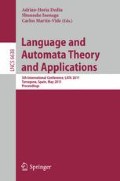Abstract
In this paper, functorial languages with the following characteristic are investigated: if two functor-argument structures occur in at last one common functorial context, then they are intersubstitutable on arguments’ positions in all elements (sentences) of a language. We prove learnability of the class of all such languages (in the model of Gold). Since our class has infinite elasticity, we could not employ a widely used method of learnability proving. Instead, we adopted Buszkowski’s discovery procedure, based on unification.
Access this chapter
Tax calculation will be finalised at checkout
Purchases are for personal use only
Preview
Unable to display preview. Download preview PDF.
References
Angluin, D.: Finding patterns common to a set of strings. J. Comput. Syst. Sci. 21(1), 46–62 (1980)
Angluin, D.: Inductive inference of formal languages from positive data. Information and Control 45(2), 117–135 (1980)
Angluin, D.: Inference of reversible languages. Journal of the ACM 29(3), 741–765 (1982)
Béchet, D., Foret, A.: k-valued non-associative lambek grammars are learnable from generalized functor-argument structures. Theor. Comput. Sci. 355(2), 139–152 (2006)
Buszkowski, W.: Typed functorial languages. Bull. Polish Acad. Sci. Math. 21, 495–505 (1986)
Buszkowski, W.: Discovery procedures for categorial grammars. In: Klein, E., van Benthem, J. (eds.) Categories, Polymorphism and Unification. Universiteit van Amsterdam, Amsterdam (1987)
Buszkowski, W.: Solvable problems for classical categorial grammars. Bull. Polish Acad. Sci. Math. (35), 373–382 (1987)
Buszkowski, W.: Classical categorial grammars. In: Kálmán, L., Pólos, L. (eds.) Papers from the Second Symposium on Logic and Language, Budapest, Akadémiai Kiadó, pp. 243–260 (1990)
Buszkowski, W., Penn, G.: Categorial grammars determined from linguistic data by unification. Studia Logica XLIX(4), 431–454 (1990)
Clark, A., Eyraud, R.: Polynomial identification in the limit of substitutable context-free languages. Journal of Machine Learning Research 8, 1725–1745 (2007)
Gold, E.M.: Language identification in the limit. Information and Control 10, 447–474 (1967)
Kanazawa, M.: Identification in the limit of categorial grammars. Journal of Logic, Language and Information 5(2), 115–155 (1996)
Kanazawa, M.: Learnable Classes of Categorial Grammars. In: Studies in Logic, Language and Information. CSLI Publications & FoLLI, Stanford (1998)
Lloyd, J.W.: Foundations of Logic Programming. Springer, Berlin (1987)
Marciniec, J.: Infinite set unification with application to categorial grammar. Studia Logica LVIII(3), 339–355 (1997)
Marciniec, J.: Optimal unification of infinite sets of types. Fundamenta Informaticae 62(3,4), 395–407 (2004)
Solomonoff, R.J.: A formal theory of inductive inference. part I. Information and Control 7(1), 1–22 (1964)
Solomonoff, R.J.: A formal theory of inductive inference. part II. Information and Control 7(2), 224–254 (1964)
Tarski, A.: A decision method for elementary algebra and geometry. Technical Report R-109, The Rand Corporation, Santa Monica, CA, USA (1957)
Wright, K.: Identification of unions of languages drawn from an identifiable class. In: COLT 1989: Proceedings of the Second Annual Workshop on Computational Learning Theory, pp. 328–333. Morgan Kaufmann Publishers Inc., San Francisco (1989)
Author information
Authors and Affiliations
Editor information
Editors and Affiliations
Rights and permissions
Copyright information
© 2011 Springer-Verlag Berlin Heidelberg
About this paper
Cite this paper
Marciniec, J. (2011). Tarski’s Principle, Categorial Grammars and Learnability. In: Dediu, AH., Inenaga, S., Martín-Vide, C. (eds) Language and Automata Theory and Applications. LATA 2011. Lecture Notes in Computer Science, vol 6638. Springer, Berlin, Heidelberg. https://doi.org/10.1007/978-3-642-21254-3_30
Download citation
DOI: https://doi.org/10.1007/978-3-642-21254-3_30
Publisher Name: Springer, Berlin, Heidelberg
Print ISBN: 978-3-642-21253-6
Online ISBN: 978-3-642-21254-3
eBook Packages: Computer ScienceComputer Science (R0)

